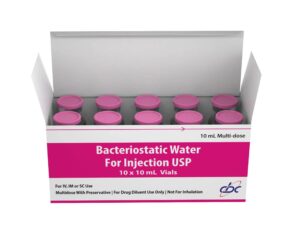When you hear the term sodium chloride water, your first thought might be: “Isn’t that just salt water?” Technically, yes. But in the medical and health world, this seemingly simple solution plays a far more important role than most people realize. From wound care and hydration to skincare and eye treatments, sodium chloride water—also known as saline solution—is everywhere. It’s one of the most versatile and widely used products in healthcare settings, and chances are, you’ve used it more than once without even thinking about it.
But what exactly is it, and why is it so essential? Let’s dive into the details.
What Is Sodium Chloride Water?
At its most basic level, sodium chloride water is a mixture of salt (sodium chloride) and purified water. But it’s not the kind of salty tap water you’d find after a swim in the ocean. In medical and pharmaceutical contexts, it’s a carefully formulated solution, usually 0.9% sodium chloride—also called “normal saline.” This percentage is key because it matches the salt concentration found in our body’s natural fluids, such as blood and tears. This balance makes it safe to use inside the body and on sensitive tissues.
Common Uses of Sodium Chloride Water
Sodium chloride water might not grab headlines, but its uses are vast, and its impact is significant. Here’s a look at where you might find it being used:
1. Intravenous (IV) Therapy
One of the most common uses of sodium chloride water is in IV drips. It helps rehydrate patients, deliver medications, and maintain blood pressure. Its balanced composition allows it to enter the bloodstream without disrupting the body’s natural chemistry.
2. Wound Cleaning
Because it’s sterile and gentle, saline solution is ideal for cleaning cuts, scrapes, and surgical sites. It removes debris and bacteria without irritating the tissue, unlike hydrogen peroxide or alcohol, which can be too harsh.
3. Nasal Irrigation
If you’ve ever used a saline nasal spray or a neti pot, you’ve used sodium chloride water. It helps clear out mucus and allergens from nasal passages, providing relief during colds, allergies, or sinus infections.
4. Eye Care
Sterile saline is also used to rinse eyes, clean contact lenses, or treat irritation. Since it mimics natural tears, it won’t sting or cause discomfort when applied.
5. Skincare and First Aid
Sodium chloride water is a gentle way to cleanse the skin—especially useful for people with sensitive skin or conditions like acne, eczema, or rosacea. It’s also used in wound sprays and some over-the-counter acne products.
Why It Works: The Science Behind Sodium Chloride Water
What makes sodium chloride water so effective is its isotonic nature. That 0.9% salt concentration is not a random number—it’s specifically designed to mirror the salinity of our body’s own fluids. This means it can flow through our systems without disrupting cell function or causing irritation. Because of this compatibility, sodium chloride water is incredibly safe and well-tolerated by people of all ages, from infants to the elderly.
Additionally, it’s sterile when packaged correctly, which is critical in medical environments. This sterility ensures there are no harmful bacteria or contaminants that could lead to infections when the solution is used in wounds, injections, or sensitive areas.
How It Differs from Other Solutions
It’s easy to assume all “salt water” is the same, but not all saline solutions are created equal. Sodium chloride water used in clinical settings must be prepared under strict standards to ensure it’s sterile and balanced. You might also come across variations like bacteriostatic saline, which includes a small amount of a preservative, allowing the solution to be used multiple times from the same vial over a limited period.
Other types of saline may be hypertonic (more concentrated) or hypotonic (less concentrated), used for specific medical needs. But for general use, 0.9% isotonic sodium chloride water remains the gold standard.
Where to Get Quality Sodium Chloride Water
Because sodium chloride water is so widely used, it’s available at pharmacies, hospitals, and online medical suppliers. However, it’s important to purchase it from a trusted source to ensure you’re getting a product that’s properly manufactured, sterile, and safe.
When choosing where to buy, look for suppliers that offer transparent product information, follow strict quality controls, and provide excellent customer support. One such provider is Bacteriostatic Water USA, known for offering medical-grade water products, including sodium chloride water, designed for safety and performance.
Tips for Safe Use at Home
While sodium chloride water is safe and non-toxic, there are a few guidelines to follow when using it at home:
Check expiration dates: Don’t use expired saline, especially if it’s meant for injection or wound care.
Use sterile packaging: Always choose sealed, sterile containers to avoid contamination.
Don’t DIY: Avoid making your own saline at home for medical use, as it’s hard to ensure proper sterilization.
Store properly: Keep it in a cool, dry place and away from direct sunlight.
Final Thoughts
Sodium chloride water might seem simple, but it plays a surprisingly important role in healthcare, personal care, and wellness routines. Its safety, versatility, and effectiveness make it a staple in homes and hospitals alike. Whether you’re using it to rinse your sinuses, hydrate after illness, or clean a minor wound, you’re benefiting from a solution that’s been refined through years of medical science.
Sometimes, the most powerful tools in health and healing are the simplest—and sodium chloride water is a perfect example of that.